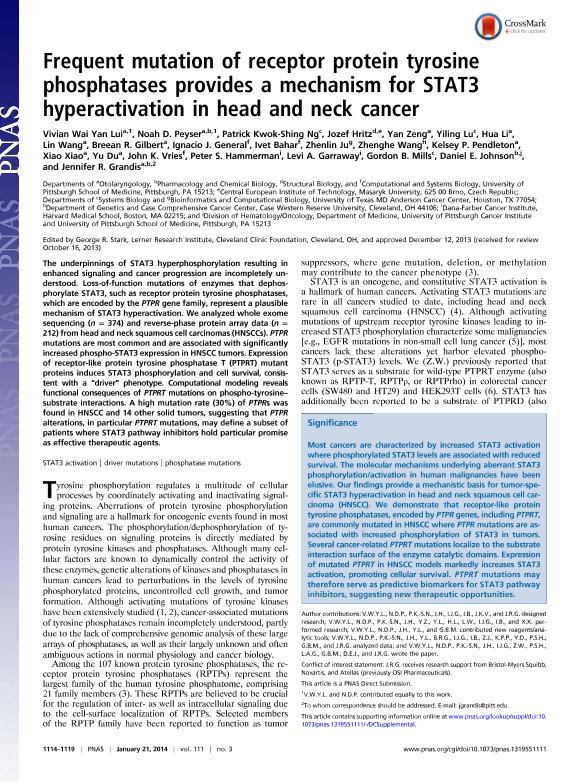Mostrar el registro sencillo del ítem
dc.contributor.author
Lui, Vivian Wai Yan
dc.contributor.author
Peyser, Noah D.
dc.contributor.author
Ng, Patrick Kwok-Shing
dc.contributor.author
Hritz, Jozef
dc.contributor.author
Zeng, Yan
dc.contributor.author
Lu, Yiling
dc.contributor.author
Li, Hua
dc.contributor.author
Wang, Lin
dc.contributor.author
Gilbert, Breean R.
dc.contributor.author
General, Ignacio

dc.contributor.author
Bahar, Ivet
dc.contributor.author
Ju, Zhenlin
dc.contributor.author
Wang, Zhenghe
dc.contributor.author
Pendleton, Kelsey P.
dc.contributor.author
Xiao, Xiao
dc.contributor.author
Du, Yu
dc.contributor.author
Vries, John K.
dc.contributor.author
Hammerman, Peter S.
dc.contributor.author
Garraway, Levi A.
dc.contributor.author
Mills, Gordon B.
dc.contributor.author
Johnson, Daniel E.
dc.contributor.author
Grandis, Jennifer R.
dc.date.available
2020-01-28T20:16:20Z
dc.date.issued
2014-01
dc.identifier.citation
Lui, Vivian Wai Yan; Peyser, Noah D.; Ng, Patrick Kwok-Shing; Hritz, Jozef; Zeng, Yan; et al.; Frequent mutation of receptor protein tyrosine phosphatases provides a mechanism for STAT3 hyperactivation in head and neck cancer; National Academy of Sciences; Proceedings of the National Academy of Sciences of The United States of America; 111; 3; 1-2014; 1114-1119
dc.identifier.issn
0027-8424
dc.identifier.uri
http://hdl.handle.net/11336/96056
dc.description.abstract
The underpinnings of STAT3 hyperphosphorylation resulting in enhanced signaling and cancer progression are incompletely understood. Loss-of-function mutations of enzymes that dephosphorylate STAT3, such as receptor protein tyrosine phosphatases, which are encoded by the PTPR gene family, represent a plausible mechanism of STAT3 hyperactivation. We analyzed whole exome sequencing (n = 374) and reverse-phase protein array data (n = 212) from head and neck squamous cell carcinomas (HNSCCs). PTPR mutations are most common and are associated with significantly increased phospho-STAT3 expression in HNSCC tumors. Expression of receptor-like protein tyrosine phosphatase T (PTPRT) mutant proteins induces STAT3 phosphorylation and cell survival, consistent with a “driver” phenotype. Computational modeling reveals functional consequences of PTPRT mutations on phospho-tyrosine–substrate interactions. A high mutation rate (30%) of PTPRs was found in HNSCC and 14 other solid tumors, suggesting that PTPR alterations, in particular PTPRT mutations, may define a subset of patients where STAT3 pathway inhibitors hold particular promise as effective therapeutic agents.
dc.format
application/pdf
dc.language.iso
eng
dc.publisher
National Academy of Sciences

dc.rights
info:eu-repo/semantics/openAccess
dc.rights.uri
https://creativecommons.org/licenses/by-nc-sa/2.5/ar/
dc.subject
DRIVER MUTATIONS
dc.subject
PHOSPHATASE MUTATIONS
dc.subject
STAT3 ACTIVATION
dc.subject.classification
Bioquímica y Biología Molecular

dc.subject.classification
Ciencias Biológicas

dc.subject.classification
CIENCIAS NATURALES Y EXACTAS

dc.title
Frequent mutation of receptor protein tyrosine phosphatases provides a mechanism for STAT3 hyperactivation in head and neck cancer
dc.type
info:eu-repo/semantics/article
dc.type
info:ar-repo/semantics/artículo
dc.type
info:eu-repo/semantics/publishedVersion
dc.date.updated
2019-10-07T17:58:18Z
dc.journal.volume
111
dc.journal.number
3
dc.journal.pagination
1114-1119
dc.journal.pais
Estados Unidos

dc.journal.ciudad
Washington
dc.description.fil
Fil: Lui, Vivian Wai Yan. University of Pittsburgh; Estados Unidos
dc.description.fil
Fil: Peyser, Noah D.. University of Pittsburgh; Estados Unidos
dc.description.fil
Fil: Ng, Patrick Kwok-Shing. University Of Texas Md Anderson Cancer Center;
dc.description.fil
Fil: Hritz, Jozef. University of Pittsburgh at Johnstown; Estados Unidos. University of Pittsburgh; Estados Unidos. Masaryk University; República Checa
dc.description.fil
Fil: Zeng, Yan. University of Pittsburgh at Johnstown; Estados Unidos. University of Pittsburgh; Estados Unidos
dc.description.fil
Fil: Lu, Yiling. University Of Texas Md Anderson Cancer Center;
dc.description.fil
Fil: Li, Hua. University of Pittsburgh; Estados Unidos. University of Pittsburgh at Johnstown; Estados Unidos
dc.description.fil
Fil: Wang, Lin. University of Pittsburgh; Estados Unidos. University of Pittsburgh at Johnstown; Estados Unidos
dc.description.fil
Fil: Gilbert, Breean R.. University of Pittsburgh; Estados Unidos. University of Pittsburgh at Johnstown; Estados Unidos
dc.description.fil
Fil: General, Ignacio. University of Pittsburgh; Estados Unidos. University of Pittsburgh at Johnstown; Estados Unidos
dc.description.fil
Fil: Bahar, Ivet. University of Pittsburgh at Johnstown; Estados Unidos. University of Pittsburgh; Estados Unidos
dc.description.fil
Fil: Ju, Zhenlin. University Of Texas Md Anderson Cancer Center;
dc.description.fil
Fil: Wang, Zhenghe. Case Western Reserve University; Estados Unidos
dc.description.fil
Fil: Pendleton, Kelsey P.. University of Pittsburgh; Estados Unidos. University of Pittsburgh at Johnstown; Estados Unidos
dc.description.fil
Fil: Xiao, Xiao. University of Pittsburgh at Johnstown; Estados Unidos. University of Pittsburgh; Estados Unidos
dc.description.fil
Fil: Du, Yu. University of Pittsburgh at Johnstown; Estados Unidos. University of Pittsburgh; Estados Unidos
dc.description.fil
Fil: Vries, John K.. University of Pittsburgh; Estados Unidos. University of Pittsburgh at Johnstown; Estados Unidos
dc.description.fil
Fil: Hammerman, Peter S.. Harvard Medical School; Estados Unidos
dc.description.fil
Fil: Garraway, Levi A.. Harvard Medical School; Estados Unidos
dc.description.fil
Fil: Mills, Gordon B.. University Of Texas Md Anderson Cancer Center;
dc.description.fil
Fil: Johnson, Daniel E.. University of Pittsburgh at Johnstown; Estados Unidos. University of Pittsburgh; Estados Unidos
dc.description.fil
Fil: Grandis, Jennifer R.. University of Pittsburgh; Estados Unidos. University of Pittsburgh at Johnstown; Estados Unidos
dc.journal.title
Proceedings of the National Academy of Sciences of The United States of America

dc.relation.alternativeid
info:eu-repo/semantics/altIdentifier/doi/https://doi.org/10.1073/pnas.1319551111
dc.relation.alternativeid
info:eu-repo/semantics/altIdentifier/url/https://www.pnas.org/content/111/3/1114
Archivos asociados
